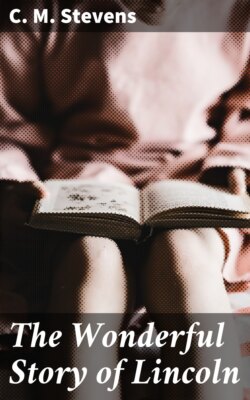Читать книгу The Wonderful Story of Lincoln - C. M. Stevens - Страница 15
На сайте Литреса книга снята с продажи.
II. HOW THE LINCOLN BOY MADE THE LINCOLN MAN
ОглавлениеTable of Contents
The American boy, seeing anything of great interest accomplished, wants to know how it was done. That is true all the way from winning some game at play to making a million in some great enterprise. But far more, in fact immeasurably more, is the making of a masterful mind, the development of a nation-making character, and of a world-historical man. Such was Abraham Lincoln, who was built up from what seems to be nothing on to the very highest worth of mankind. How did he do it? “If I only knew how,” said a philosopher-mathematician, “I could turn the world over with a lever.” “If I only knew how,” said a philosopher-farmer, “I could make a three-year-old calf between now and next Christmas.” In other words, the belief has always prevailed that by thought made into will anything can be accomplished, provided thinking perseveres in the right way for the right thing. Successful “might” always promotes the belief that it is right because it is successful, but the “successful” is no more than a temporary expedient toward coming failure, if it is not the righteousness of an immortal social system.
So let us see how Lincoln did it. It is not much of a mystery how he became a masterful man. There must be a beginning place, and, for such a person, it must be a divine beginning place. He had a loving mother and a home. It was the basis of his belief in humanity. The heart of the world he believed to be like the two noble-souled women who mothered his young heart and growing mind. He says himself that he didn’t do it but that they did it. So, the first thing for a boy who wants to be a masterful man is to take the advice of Oliver Wendell Holmes to have the right kind of ancestors. At least, it seems quite necessary for him to choose a loving mother and it will be a lightened task for him to do the rest.
In 1823, while going to the Crawford school, there occurred an incident representing his invariable sense of honor. A buck’s head was nailed to the wall and one day, probably experimenting as all boys do, he pulled too hard on one of the horns and broke it off. No one saw him and when the teacher inquired for the mischief maker Lincoln promptly told how it happened. The teacher believed him and said no more about it.
The first reprehensible thing known of the Lincoln boy was done soon after the death of his sister. She married at nineteen and died the next year. Lincoln believed, as most others believed, that she died of ill-treatment. There was no way to express his fierce resentment but in writing, and he wrote some scurrilous letters to the ones against whom he was so angry. Some biographers, in the supposed cause of history, have published some alleged copies of those letters, but at worst they merely show what a boy could do in the distress occasioned by what he believed to be the murder of his sister, whom we may believe was the one great love of his life after the death of his mother.
Being a good penman, Lincoln was often called on to write a line in copybooks. Among the proud possessors of a copybook so favored was Joe Richardson. In his book Lincoln wrote these commonplace, yet significant lines:
